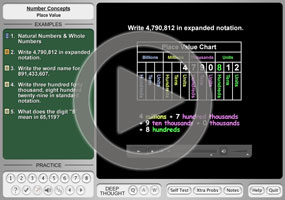Place Value: Whole Numbers
Purplemath
Our fingers are called "digits", and the numerals 0, 1, 2, 3, 4, 5, 6, 7, 8, and 9 are also called "digits". ("Numerals" are "characters used to write numbers".) We use these ten digits, along with the concept of place value, in exactly the same sense that we were using our fingers and our piles of marbles on the previous page: a certain "place" tells us what unit we're working with, and the digit tells us how many we need of that unit.
Content Continues Below
So, for instance, the expression "264" means "two 100s, plus six 10s, plus four 1s", because hundreds, tens, and ones are what are stored in those particular places. In what is called "expanded notation", the number "264" can be written as:
200 + 60 + 4 = 2×100 + 6×10 + 4×1
Our place-value system is called the "decimal" system, because it's based on "all my fingers" (in other words, on the fact that we have ten fingers). That is to say, the "base" of our number system is ten. We start with ones, being our fingers (that is, being our counting "units"). Then we go to tens, being sets of fingers. Then we go to ten sets of ten fingers, which is 10 × 10 = 100; that is, we go to hundreds.
In other words, every time we go one "place" further to the left (that is, every time we go into a unit that is one jump bigger than the previous place's unit), we multiply by our base of ten:
← swipe to view full table →
expression |
|
place name |
1 |
|
ones |
10 |
|
tens |
100 |
|
hundreds |
1,000 |
|
thousands |
10,000 |
|
ten thousands |
100,000 |
|
hundred thousands |
1,000,000 |
|
millions |
10,000,000 |
|
ten millions |
100,000,000 |
|
hundred millions |
1,000,000,000 |
|
billions (or "milliards" in Europe) |
1,000,000,000,000 |
|
trillions (or "billions" in Europe) |
The commas marking off sets of three digits, like the comma between the 1 to the left and the three 0s to the right in "1,000", are used to make it easier for people to read the numbers. Properly, if you spell out a number in words, you should use commas at those same spots. So 1,234 would be spelled out as "one thousand, two hundred thirty-four".
Note: There should not be an "and" between the "hundred" and the "thirty-four" in "234"; you should not pronounce "234" as "two hundred 'and' thirty-four". Yes, I know that's how most people say it; it's still wrong.
-
Write the number 32,067 in expanded notation.
To "expand" this number, I need to split it up into its different places. If I'm not sure of my places, I'll count them out, starting from the right-hand digit.
Affiliate
This number has five digits. From the table above (if I haven't memorized this information yet), I know that this means that I'm dealing with tens of thousands. The one comma tells me that I'm dealing with thousands, too; one comma means I'm into the thousands, two commas would have meant I'd have been into the millions, and so forth.
So I've got three 10,000s, two 1,000s, zero 100s, six 10s, and seven 1s. Usually, we ignore the zeroes in expanded notation, so this gives me:
30,000 + 2,000 + 60 + 7
-
Write the standard form for the number which, in expanded notation, is written as follows: 9,000 + 300 + 2
I've got nine thousands, three hundreds, and two ones. I don't have any tens in the expanded form, so I'll need to use a zero in the tens place to keep that slot open. Then my standard form is:
9,000 + 300 + 0 + 2 = 9,302
-
For the number 52,973, (a) state the place held by the 2, and (b) state the digit in the tens place.
a) The 2 is immediately to the left of the comma. I only have the one comma, so I know this number only goes into the thousands. In the thousands, I've got "52", so the 2 is in the thousands place. (The 5 is in the ten-thousands place.)
b) The tens place is the second place, just to the left of the 3 in the ones place. There is a 7 in this second place, so the digit in the tens place is 7.
-
State the number 622,937,285 in words.
The commas break this number into digestible pieces. The "285" is in terms of ones, tens, and hundreds of ones (or of just "regular numbers", in extremely informal language). The "937" is in terms of ones, tens, and hundreds of thousands. And the "622" is in terms of ones, tens, and hundreds of millions.
← swipe to view full table →
millions |
|
thousands |
|
(regular) |
622 |
|
937 |
|
285 |
So the number they gave me, when I spell it out in words, is:
six hundred twenty-two million, nine hundred thirty-seven thousand, two hundred eighty-five.
URL: https://www.purplemath.com/modules/placeval2.htm
Select a Course Below
Standardized Test Prep
Homeschool Math
© 2024 Purplemath, Inc. All right reserved. Web Design by ![]()



